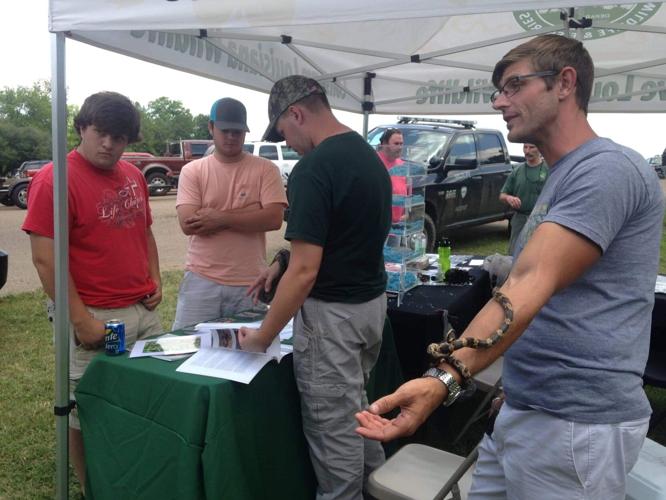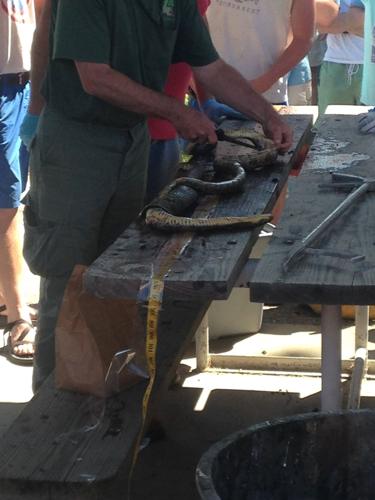Long ago, the mythical serpent lured Eve and then Adam into doom with the promise of forbidden knowledge.
The result, according to Genesis, was enmity between humans and reptiles. Snakes will strike at men's heels, while men will crush their heads, the story goes.
On Saturday, the people of Lake Providence will take that enmity onto the water. Armed with shotguns, they'll embark on a decades-old tradition that's drawn the ire of animal-rights groups: the snake rodeo, in which teams head out on the lake and shoot as many serpents as they can.
Lake Providence's rodeo, which dates to at least the 1960s, is not an annual event, but is called whenever local residents' tolerance for their scaly neighbors wanes, according to Sheriff Wydette Williams. This year's is the first since 2019 after subsequent ones were canceled by the pandemic, said Williams, whose office organizes the event.
The calls from residents for a rodeo often come in the spring, when the Mississippi River rises and drives more snakes into the lake, Williams said.
"Our snake problem gets to be real serious," he said. "We have frequent areas that flood."
Shoot as many as you can
Snake lovers and others, however, have pleaded with the Sheriff to end the rodeo altogether or change the event so that the snakes aren't killed. They note that most of the snakes killed are diamondback watersnake, which aren't venomous.
They've urged Williams and others to follow the lead of some other snake roundups around the country, which have become no-kill events.

East Carroll Parish Sheriff Wydette Williams
Williams has not been swayed, though he said he had nothing against those who want to protest the event.
"I welcome them," he said. "They have a right to be here."
The rodeo's rules are simple: two shotguns per boat, shoot as many snakes as you can over five hours, and then bring them back to the weigh-in at the end of the event.
There are prizes for the team that kills the most snakes and the team that kills the longest snake. There are no limitations on the type or size of snake, just that they have to be dead when measured.
A representative from the Louisiana Department of Wildlife and Fisheries plans to be on hand to confirm that participants have their fishing licenses up to date, a spokesman said.
The only good snake...
Lake Providence, with approximately 3,500 residents, is the parish seat of East Carroll in the northeastern corner of Louisiana. The town sits along the Mississippi River and next to the oxbow lake from which it derives its name.
The snake rodeo is not unique to the area. Similar snake "rodeos" or "roundups" have been held all over the country for years, even reaching the level of being lampooned on a 1993 episode of The Simpsons about Springfield's "Whacking Day."
The most common is a rattlesnake roundup, where typically the meat is eaten and the skins are used.
The number of rodeos where snakes are killed has dwindled in recent years, as organizers have adopted catch and release policies or pursued purely educational aims.
That's what Brad "Bones" Glorioso would like to see happen in Lake Providence. Glorioso, a herpetologist and founder of the group Louisiana Amphibian and Reptile Enthusiasts, or LARE, attended the 2016 rodeo with several live snakes that he showed to interested attendees.
"You hear the tired old line that the only good snake is a dead snake," he said, asking what would people think if you replaced "snake" in that saying with "puppy."
"That's how I feel when people tell me that line," he said.
'They'll just kill anything'
Glorioso said his purpose in going was to educate people about snakes, not to try to stop them from participating in the rodeo. Most of the snakes killed in the Lake Providence rodeo are harmless, he said.
"Most of them have no idea how to ID them or just don't care," he said. One team, he recounted, brought their entire catch over to him, and when he pointed out that not one was venomous, they were astounded.
Often, the snake that wins the prize for being the longest is a ratsnake, a nonvenomous snake that can grow to more than seven feet, Glorioso said.
"They'll just kill anything," Glorioso said.
In 2019, of the 134 snakes killed in the rodeo, 88 of them were Diamond-backed Watersnakes, according to numbers from the Advocates for Snake Preservation, which has called for the rodeo to end. Only 22 were Northern Cottonmouths, the venomous water moccasin that inspires fear. The others were all non-venomous species, including watersnakes, ratsnakes and kingsnakes, the group reported.
The year before, only 46 of the 254 snakes killed were venomous, according to the numbers.
Williams said the killed snakes are used for research, but Glorioso questioned that. The year he went, he said he saw the carcasses, which after being counted are often just piled up like a big plate of herpetological spaghetti, dumped back in the water when the rodeo ended.
Glorioso and others have started an online petition to end the rodeo, though he thinks just teaching people about snakes' value to the local ecosystem has a better shot of accomplishing that goal.
Snakes, even poisonous ones, are essential in keeping fish stocks healthy by culling sick or weak fish. Snakes are also prey for a spectrum of Louisiana birds, including hawks and herons, he said.
"There's no evidence that what they are doing has any beneficial effect," Glorioso said.
Snakes need love
Recent snake rodeos, like this year's, have not been heavily promoted online, perhaps due to negative attention received in 2016, when the Sheriff's office got calls and a reporter for the National Resources Defense Council covered the event and wrote a scathing piece about it.
But Williams said the event didn't require promotion.
"It's pretty much local," he said. "There's no need for promoting or putting money into that."
Glorioso, who said he didn't plan to attend this year's rodeo, said people just need to learn to live with snakes and other creepy-crawlies instead of shooting them on sight.
"We got to coexist with these animals," he said. "Snakes need the most love because they get the most hate."



